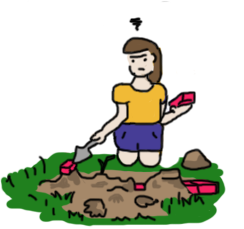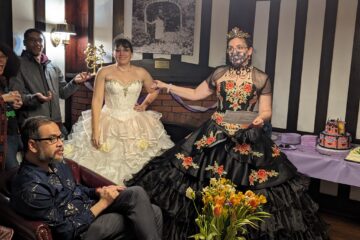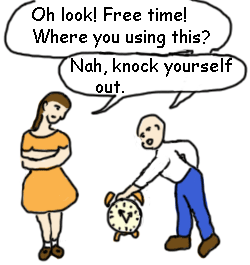I was in second grade, I’m pretty sure, but maybe first. That age where, every week, we had to fold a piece of paper in half, lengthwise, and number ten lines for our spelling test. The teacher would pace sedately down the aisles between desks, watching us bent dutifully with our pencils as she intoned, “One. ‘Bright.’ Two. ‘Right’ as in ‘right handed’.”
I don’t remember any of the words that week, though I have vivid memories of the week we did pronouns and prepositions, which was WONDERFUL, (except for the whole its/it’s thing which felt like cheating — it’s a spelling test, not a punctuation test!) And I remember this was before the time one of the words was “together” (which was our first three-syllable word and I couldn’t wrap my head around it until the teacher advised me to break it up into to-get-her.) It was a forgettable weekly spelling test, like dozens before and hundreds after. Ten random words we were given in a list at the beginning of the week in the hopes that we would slowly fill up our store of English Language.
What I do remember is I got a D this particular week. A D minus.
I was sitting in the passenger seat of our red Chevy station wagon, beige interior, faux leather print plastic dashboard with faux stitches running in neat plastic lines. I don’t remember why I got shotgun that day over my older sister, or how I presented the news, if Mom had asked or one of my sisters had spilled the beans. Mom’s hands wrung the steering wheel as if I had confessed to alcoholism, or turning Republican. “A D. A D! You’re failing. Failing out of school already? You can’t spell? Spell ‘School’!”
She looked expectantly at me, almost vibrating with importance.
“That wasn’t on the test,” I said.
“I don’t care what was on the test! Spell ‘school’!”
“S … uh … ” I knew this one was not how it was pronounced. “… H?”
She hit the wheel with her open palm. “Spell ‘arithmetic’.”
That was an even harder word! And again, not on the test. What did this have to do with it? I sputtered and stammered, brain and mouth utterly useless, feeling humiliated, forced not just to confess my ignorance but to demonstrate it for the whole family.
The car slammed to a stop, my body jerked into the hard line of the seatbelt. Mom turned to me, shaking with rage. “Can you spell ‘FLUNK’?”
I made some soft, helpless, hiccup of a sound, trying to say “I” to begin the sentence “I know how to spell that,” and she grabbed the hair at the back of my head. My face hit the faux leather. “Spell ‘flunk’!” she shouted, “can you spell THAT? Can you spell ‘flunk’?!” She hammered my head into the dash in time to her words.
Spell “flunk.”
Spell “on welfare for the rest of your life.”
Spell “failure.”
Fists, slaps … a whirl of arms and hands and spittle flying from sibilant sounds.
Spell “useless stupid idiot brat selfish lazy”
Spell “flunk. flunk. flunk. flunk. flunk.”
I don’t remember how long it lasted. Where was this car? Our driveway? The side of a road? K-mart? It wasn’t the first or last time my mother hit me, but this particular time was so unhinged with violence I was stunned, unable to do anything but snivel and hold my arms in front of my face as she slapped my body and tore at my hair. I knew she was demanding some reaction from me that I couldn’t give. She was unstoppable, inexhaustible.
My sisters watched in silence. They’d had less warning than I did. They were suffering through this embarrassing, emotional display, and it was my fault, because I was so fucking stupid.
It’s only several decades later I wonder: why not pop out of my seat belt, open the car door and run? Why didn’t my sisters protest? Mom was five foot four, maybe 130 pounds soaking wet. There were three of us. My older sister had to have been thirteen at the least, and was probably fourteen, starting to overtake Mom’s tiny height.
There’s a helplessness you learn, when you’re abused. None of us could have lifted a finger against her any more than we could have suddenly gained the ability to fly.
To this day, my older sister will occasionally flash a vicious little grin and say, “remember ‘Spell Flunk’?” And the feeling it invokes is one of shame as well as horror.
To be honest, half of this is reconstruction. I remember the dialog, but not the setting. I only know Terrisa was there because she refers to it so readily. I know Grace was there because she was always there — and we’ve spoken of the event, though only obliquely, or by its title, “Was that worse than ‘Spell Flunk’?”
Grace remembers it completely differently.
Grace remembers coming home from school and handing over our school work, including the dreaded spelling test, in the living room, not thinking anything of it because up to that point in our lives, school work was always a positive, always a reason for praise.
I picture walking up the front walk, my books in hand, hoping for some sympathy for this hateful letter on my paper, red ink slashing my mistakes like wounds. Mom should kiss it better. Mom sitting on a tattered sofa covered in crocheted afghans, putting on her reading glasses, taking the innocent paper with a frown of confusion, like I’d handed over a bill. The paper shaking, and then Mom popping up, the paper thrown, the first line of dialog, “You’re failing out of school already?”
Grace remembers being the one who failed the test, the one who was hit, not me.
It startled me to hear her say that, recently when we talked about this. How could we be carrying these parallel worlds, both victim, both witness?
Maybe she was. Memory is mutable. Or maybe Mom hit and screamed at us both. We were often punished as a unit.
I think the living room is right … there was no setting to my memories, I had to pick one, and I liked how putting it in the car meant I didn’t have to provide positions for everyone. The separation of the seats provided an easy excuse for my sisters not to intervene. The head-slam-into-dash certainly happened, but it was a different infraction. Perhaps I’d said I loved my father, or had been caught shoplifting.
(“Yeah,” Grace confirms, “I remember the car dash incident. It was a different day. I don’t remember why she did it, though.”)
Here is the real memory: anxiety with hope, a surprisingly adult feeling that my failing could be covered up or sugar coated, then shame, and Mom, a close-in view, all eyes and teeth and the back of her throat, like that King Crimson album cover. The words: Failing. Welfare. Flunk. Grace a small, pale, trembling figure in the background, more felt than seen.
Today, I get paid to write words. Editors gush over the clean copy I turn in. I describe myself as a terrible speller. I double-check words in tweets. Today I googled “What percentage is a D minus grade in the US?” and got 60%. That’s misspelling four out of ten words.
And the trembling, injured pride still clenches a fist in my chest, because yes, I did know, at the time, as soon as she asked it, how to spell flunk.


